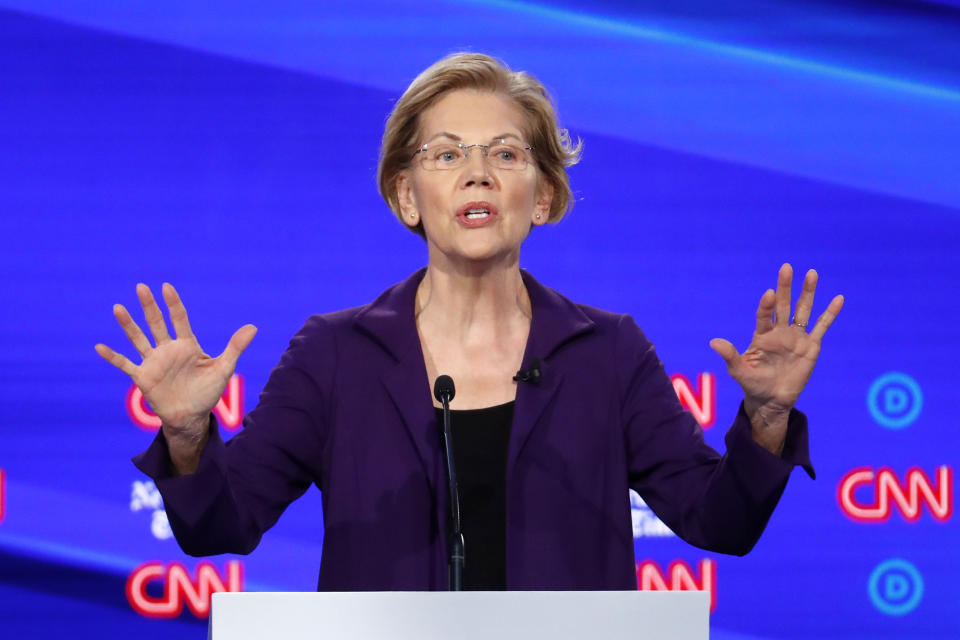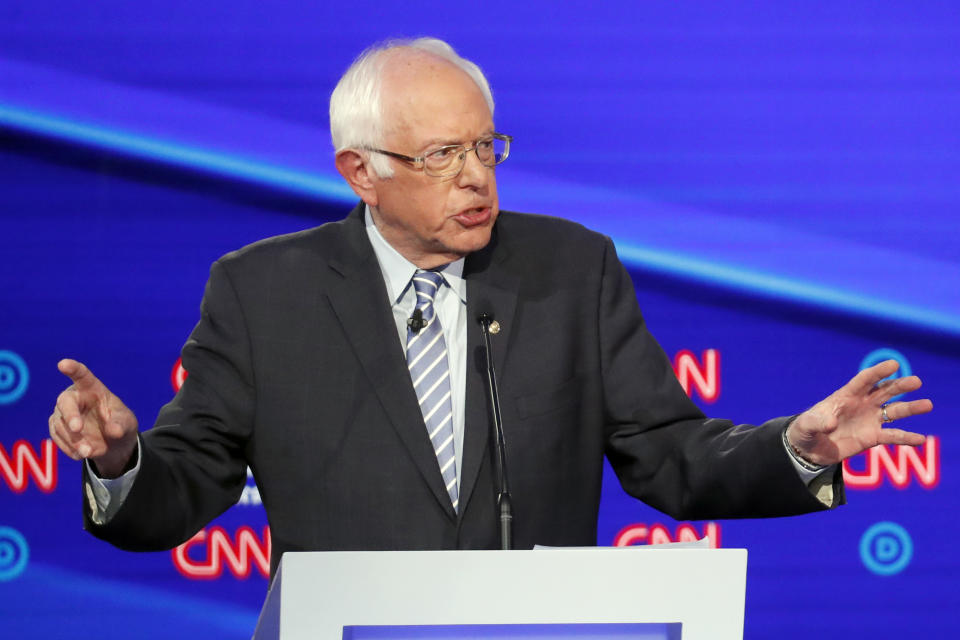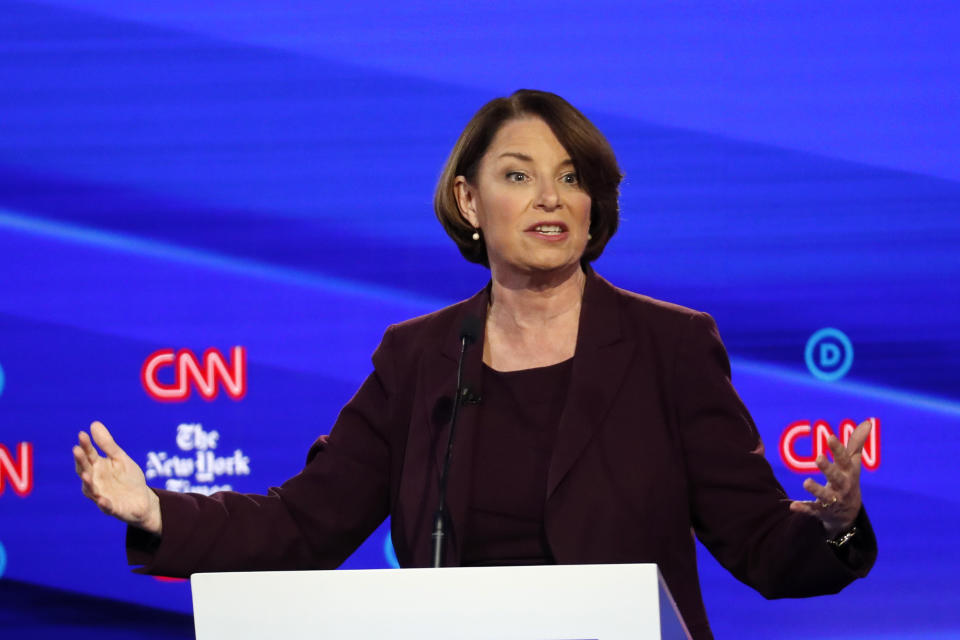After the debate, who's up, who's down in the Democratic primary?
Welcome to 2020 Vision, the Yahoo News column covering the presidential race with one key takeaway every weekday and a wrap-up each weekend. Reminder: There are 110 days until the Iowa caucuses and 384 days until the 2020 election.
At the end of the night, the same 12 candidates were standing at their lecterns as at the beginning, and it would be hard to say if many minds were changed by the Democratic primary debate Tuesday at Ohio’s Otterbein University. But it did bring some differences among them into sharper focus, setting the stage for the next phase of the primary process, which will begin to see the field narrow down to the serious contenders as the candidates at the bottom drop out.
They will, trust us. Here’s 2020 Vision’s exclusive analysis of how the debate affected the prospects of all 19 Democratic candidates.

1. Elizabeth Warren ➡️: If Warren wasn’t seen as the frontrunner before Tuesday night, she is now. Why? Because that’s how her rivals treated her. The Massachusetts senator faced near-constant attacks — on taxes from Beto O’Rourke, on taking down President Trump’s Twitter from Kamala Harris, on automation from Andrew Yang — and successfully parried most of them by pivoting, with her usual clarity and crispness, to broader themes. She even outmaneuvered Joe Biden in a back-and-forth about getting “big things” done, citing her role in the creation of the Consumer Financial Protection Bureau.
But in the exchange that mattered most — a multicandidate pile-on about Medicare for All that took place in the beginning of the debate, when the most people were watching — Warren got scuffed up for the first time this year. By now it’s clear that a) taxes would have to go up to pay for her health plan, and b) she will never say so, repeating only that it will “lower costs” for the middle class. The calculation, presumably, is to avoid creating a perfect sound bite for Republican attack ads in the general election. Yet Warren has built her campaign on her reputation as a truth-telling nonpolitician, so being hammered by her opponents for not answering a simple yes or no question and then not answering a simple yes or no question, over and over again on live TV, had the unwanted effect of making her look like the very kind of politician she professes not to be.
Still, Warren hit all of her favorite populist notes about how the “wealthy and well-connected have captured our democracy.” She contrasted the kind of “vague campaign that nibbles around the edges” (cough Joe Biden cough) with her “50 plans” and her signature pledge to “dream big and fight hard.” And she didn’t make any mistakes substantial enough to slow her momentum, either nationally or in the early-state polling.

2. Joe Biden ⬇️: Biden still leads in the national polls by 6 points. The Ukraine drama hasn’t depressed his numbers. Much to his team’s relief, it wasn’t even a major topic Tuesday night. Nobody attacked Hunter. Asked whether he’d made a mistake by allowing his son to do business in foreign countries while he was vice president, Biden insisted that neither of them had done anything wrong. Then everyone moved on.
It was a status quo debate for the former VP — at least until the very end. In response to a question about whether the party could beat Trump by moving to the left, Biden claimed that he was “the only one on this stage that has gotten anything really big done” — then, as if that didn’t sound condescending enough, he seemed to take credit when Warren mentioned the creation of the Consumer Financial Protection Bureau, her signature accomplishment. It was an exchange that struck many observers as high-handed and even sexist, and if cable news picks it up and plays it ad infinitum, it could turn into the bad moment that overshadows an otherwise decent debate.
3. Bernie Sanders ⬆️: The Vermont senator was his same old (78 years old, to be precise) self Tuesday night; in fact, it may have been his sharpest debate yet. After a heart attack that halted his campaign, Sanders’s vigorous performance should ease concerns about his age and health. Along with the news that Rep. Alexandria Ocasio-Cortez will be endorsing him Saturday at a rally in Queens, it may even reverse his recent dip in the polls. The question, however, is not whether Sanders can claw his way back to 17 percent; it’s whether he can expand his base to compete with Biden and especially Warren, who has been pulling away nationally and in the early states. We shall see.

4. Pete Buttigieg ⬆️: Of all the candidates onstage in Ohio, Buttigieg probably did himself the most favors with actual voters where it matters most. Progressives will continue to scoff at his criticisms of Warren, and pundits will shake their heads over his opportunism, but the South Bend, Ind., mayor had a message to deliver Tuesday night — I’m a Midwesterner who’s bolder than Biden without being as divisive as Warren — and he delivered it with military discipline. The point, of course, is not to sway Warren voters or please the chattering class. It’s to beat expectations with a top-tier finish in Iowa, where the well-funded, well-organized Buttigieg is already doubling his national numbers and nipping at Sanders’s heels for third place, then to capitalize on the resulting momentum to slingshot himself into a two-way race with Warren. With his slashing attacks on Warren’s Medicare for All dodges — “Your signature, Senator, is to have a plan for everything. Except this” — Buttigieg proved Tuesday that he would be much more difficult for her to outsmart, should Biden stumble.
5. Kamala Harris ➡️: After struggling for months to explain her candidacy and maintain momentum, Harris floated yet another message Tuesday night. (It had something to do with “justice.”) She tried to manufacture a “moment” as well, awkwardly pushing Warren to agree that Twitter should ban Trump. Neither effort clicked, but the California senator was clear and passionate enough — particularly on abortion rights — that her performance won’t affect her poll numbers either way. At 5 percent nationally and in Iowa, they remain both significantly lower than the frontrunners’ and significantly higher than the also-rans’ — meaning Harris still has a chance, however slim.
6. Amy Klobuchar ⬆️: The Minnesota senator delivered her best debate performance yet, speaking more than anyone other than Warren or Biden — and wisely using her time to punch holes in Warren’s big promises while emphasizing her own pragmatism and Midwestern roots. The problem for Klobuchar is that Buttigieg had the same strategy, and while he’s polling at 12 percent in Iowa, she’s polling at 2.7.

7. Cory Booker ⬇️: More kumbaya. More soaring, alliterative rhetoric. So far, there’s no sign that Booker’s approach is connecting — he’s been stuck at 2 percent both nationally and in Iowa for the duration of the campaign — and it’s doubtful that he finally connected onstage in Ohio. The fact is, Democrats don’t want to feel the love. They want to beat Trump. On the plus side, Booker didn’t say or do anything that could damage his VP chances, which is probably the real endgame at this point.
8. Beto O’Rourke ⬇️: The former El Paso, Texas, congressman spoke eloquently and passionately about Obama-esque liberal pieties, as usual, emphasizing how he has “always tried to bring people in to the solutions that we have to our common challenges, regardless of the differences.” But a preplanned attempt to pin down Warren on taxes fell flat, and in a heated, center-stage exchange about gun buybacks — the policy proposal that most distinguishes him from his rivals — Buttigieg wound up making him look soft and feckless.
9. Andrew Yang ⬆️: The New York tech entrepreneur kept doing his own thing Tuesday night, with smart riffs on screen time, data privacy and decriminalizing opiates for personal use. CNN even devoted entire segments to Yang’s pet themes: universal basic income and automation. It’s still impossible to imagine him securing the Democratic presidential nomination. But it’s getting easier to imagine him securing a column in Wired.

10. Julián Castro ➡️: In September’s debate, the former mayor of San Antonio, Texas, and secretary of Housing and Urban Development stood out in a bad way for bashing Biden’s age and memory. Last night, he made no impression at all. Castro has said that if he doesn’t qualify for November’s debate — a very real possibility — he will end his presidential campaign. Yet Tuesday’s docile performance suggests that his campaign for the vice presidency will continue.
11. Tom Steyer ⬆️: The California hedge fund billionaire and impeachment advocate spoke less than any other candidate Tuesday night and failed to distinguish himself when he did; basically, he just parroted Warren’s message about corporations co-opting our government. But Steyer does have something his fellow bottom-tier candidates lack: money, and lots of it, having already bought his way into the debate with a barrage of early-state ads that constitute only a fraction of the $100 million he has pledged to spend on his campaign. By virtue of that and the fact that he introduced himself to a national audience without falling flat on his face, Steyer’s chances technically went up Tuesday night. But they’re still microscopic.
12. Tulsi Gabbard ⬇️: Gabbard’s position on Syria is closer to Trump’s than to her party’s, she supports abortion restrictions, and she seems to enjoy attacking the media and the Democratic National Committee — all apostasies she was happy to accentuate Tuesday night. Alone among the candidates onstage in Ohio, the controversial congresswoman from Hawaii has long had zero chance of winning the nomination — or being tapped as someone’s running mate. Somehow, her chances are even lower now.
13-19, in no particular order: Colorado Sen. Michael Bennet, Montana Gov. Steve Bullock, Ohio Rep. Tim Ryan, author Marianne Williamson, former Maryland Rep. John Delaney, Miramar, Fla., Mayor Wayne Messam and former Pennsylvania Rep. Joe Sestak. Wait, these people are still running for president?
Download the Yahoo News app to customize your experience.
Read more from Yahoo News:
No debate about it: Dem candidates agree on impeachment inquiry
At debate, Biden defends his son — and himself — over Trump's Ukraine claims
Tulsi Gabbard clashes with Democratic rivals over 'Syrian regime change war'
Yang and O'Rourke propose decriminalizing opioids, including heroin
Warren, now perceived as the front-runner, takes hits from the the pack





